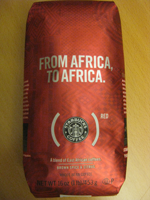Sarah Dadush sent us this response to our Cui Bono? Post.
It's gratifying that Red is willing to shed light on some of the transparency issues raised by my paper. This openness could help Red set a standard for other initiatives that resemble it. The Red model now creates many informational gaps, which extend far beyond the question of whether Bono and Shriver are making money from it.
It's not about whether to "do the (Red) thing" but about how to do it. We want to know more about whose interests our purchasing decisions are serving and in what proportion. We want to know what commercial arrangements cause the appearance of the Red logo on everything from T-shirts to strollers to laptops, and what the label represents socially.
Watchdogs, academics, journalists and blogs like this one make it their business to filter information on the public's behalf. Ensuring that regulators have access to this information is also important, because they supervise charitable activities. Hopefully this will help them to 'upgrade their choice' of regulatory tools, to use another Red slogan.
The fact that The Persuaders is required to donate its profits is reassuring though it also raises some questions: Why does the Global Fund indicate that The Persuaders is not a donor? And why not make this (positive) feature more obvious? Maybe it's because The Persuaders don't actually profit from the Red brand, so no money moves. Or maybe it's because The Persuaders would prefer to avoid regulation as a "commercial co-venturer", which would require additional disclosure.
With regard to regulating The Persuaders as a professional fundraiser, the definition of Professional Fundraiser in NY includes: "Any person who directly or indirectly by contract ... for compensation or other consideration (a) plans, manages, conducts, carries on, or assists in connection with a charitable solicitation ... ; (b) solicits on behalf of a charitable organization or any other person; or (c) who advertises that the purchase or use of goods, services, entertainment or any other thing of value will benefit a charitable organization but is not a commercial co-venturer.” The Persuaders solicits and assists in the solicitation of funds from the public through Bono and Shriver-led public outreach on T.V. shows like Oprah, and at concerts, as well as through traditional fundraising events like the Sotheby's art auction. They also engage consumers directly: when consumers buy a Red Gap T-shirt, they're buying it because it's Red, not just because it's Gap (that's the point of Red, after all). And The Persuaders are the ones coordinating the Red donation machine, which has generated over $100 million in contributions from the corporate partners. They clearly carry out these activities on behalf of the Global Fund (their only charity partner), and advertise that buying Red will benefit that charity.
These activities affect the public's trust just as traditional fundraising models do, and should be regulated accordingly. And even though The Persuaders receive no financial compensation from the Global Fund, my paper argues that the licensing fees paid to The Persuaders amount to fundraiser fees, and that the Global Fund has essentially outsourced the payment of fundraiser fees to the corporate partners.
Extending charities' regulation to encompass the Red model is important. Otherwise, the door is open to charities to avoid regulation simply by having a third party pay their fundraisers!
 From Aid to Equality
From Aid to Equality



 Not sure what to make of this, so I just state the facts: an African-American record producer arranged to have well-known African singers do U2 songs for this album. U2 obviously had to sign off on an album in which Africa thanks U2 with U2 songs, due to copyright laws, and in fact the producer thanks U2 band members.
Not sure what to make of this, so I just state the facts: an African-American record producer arranged to have well-known African singers do U2 songs for this album. U2 obviously had to sign off on an album in which Africa thanks U2 with U2 songs, due to copyright laws, and in fact the producer thanks U2 band members.